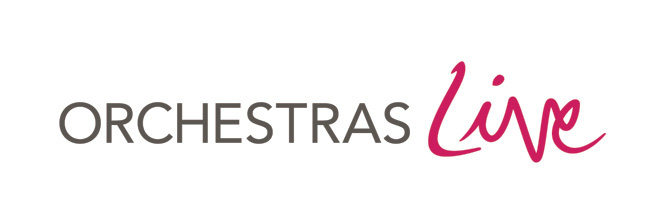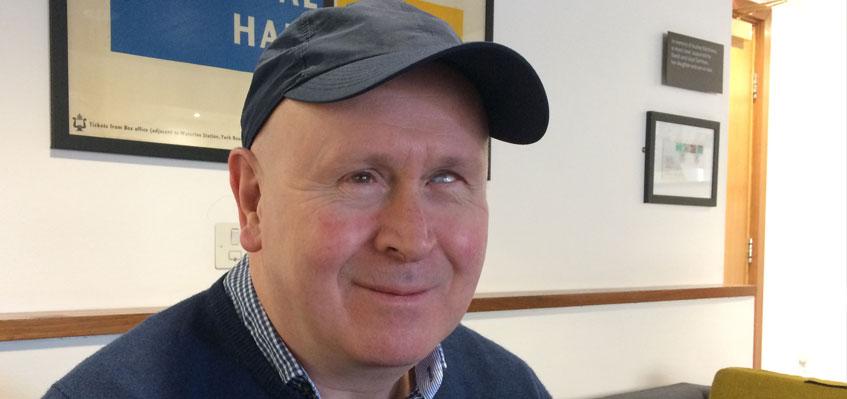This February, RPO Resound is delighted to be collaborating with visually impaired musician, composer and creative leader Adrian Lee as they once again join forces with the Royal Society for Blind Children for an exciting music project for young people with vision impairments.
Adrian, a founding member of The British Paraorchestra, will work alongside Workshop Leader Natasha Zielazinski and musicians from the Royal Philharmonic Orchestra (RPO) to inspire young people from all musical backgrounds to produce and perform brand new music on the theme of “Telling Our Story”.
Adrian’s placement is supported through, and part of, a programme of mentoring and skills development for emerging Disabled music leaders produced by Orchestras Live in collaboration with the RPO and partners in Essex. The project aims to support more Disabled musicians into creative leadership roles by facilitating conversations between artists and orchestras to access placements on existing music projects.
RPO Resound Project Manager, Sophie Plumb, met up with Adrian to find out more about him and his involvement with the RPO ahead of his placement.
Tell us about how you became a musician, composer and creative leader?
I first started fiddling on piano at home, until someone turned up at my primary school who taught guitar and suggested I should give it a go. My mum was excited about this prospect and said “yeah sure have some lessons”, so I got siphoned off to learn with a local teacher.
At around the age of seventeen, I received a grant from the local authority to study guitar at the Royal College of Music, then continued my musical studies at the University of Birmingham and York. After that I became interested in Gamelan and non-Western music, and travelled all over the world learning as much as I could. It was through my traveling that I got more into the workshopping and improvisational side of things, which led me to create a piece for gamelan and baroque trio for a production at the National Theatre, and I’ve never really looked back.
What challenges do you face as a visually impaired musician in the music industry?
I am so positive minded at the moment that I don’t feel there are many challenges which I could not face. I encountered sight-loss mid-career, but by having already worked in classical music before I became blind, I had already gained a strong visual memory of what it was like in a workshop setting or a rehearsal, which really helps me now.
Thinking more deeply about it, one of the challenges for visually impaired musicians is having enough information and time to prepare for a project or session. I can’t just turn up and sight-read something like a sighted musician can. I need time to learn it and understand how it fits with everything else in the piece.
The second challenge is access, and I think it’s important for not only visually impaired people, but also those with physical and intellectual disabilities. It’s really about feeling confident within a venue and feeling comfortable moving about in the space.
How do you overcome these challenges?
It all comes down to communication. I don’t think you can ever over communicate with people.
What can orchestras do to support more Disabled artists into music careers?
The first step is to reach out and talk to Disabled artists and find out what they need and how they can be included. There is such a wide range of ability and interest in music amongst Disabled people, but each individual has different access needs and approaches music-making in different ways.
There is a tradition in orchestras to do things in a particular way. What Disabled people can bring to music is a sense of invention and adaptation. If you have a physical disability you might have to find alternative ways to make a sound on the instrument. This then presents an unusual proposition for a composer who has to think “how is that person making that sound? I can’t write something for them that a non-disabled musician could play, but I could write them something that they can play, or give them some parameters to improvise a musical section”. So it becomes more of a negotiation and collaboration between artists and composers to find ways in which an individual can become part of the orchestra.
We are at a stage now where the challenge is the integration and bringing together of Disabled and non-disabled musicians. We need to find ways in which Disabled musicians can break through and become part of what effectively is a glass ceiling, and be accessible to mainstream audiences in a strong artistic capacity.
Does orchestral repertoire affect the accessibility of music careers for Disabled musicians?
Yes, and no really. It depends on how sacrosanct the Western cannon is and if we are prepared to look at it as source material, rather than to be performed in a particular way. For some it is problematic to adapt Western classical pieces for one’s own purpose, but when we are looking at accessibility it is probably better to level the playing field and see what we can do with a new piece.
There are technological solutions being developed all the time to enable people with visual impairments to follow the meticulous direction of a conductor, so they can play traditional repertoire. I’m having ongoing discussions with people like Drake Music about how to overcome these issues.
Why are schemes like the Orchestras Live and RPO emerging Disabled leaders programme important?
I was attracted to the RPO and Orchestras Live programme because I saw they were taking a lead on the topic and putting out a call to Disabled artists by saying “would you consider taking on a leadership role?”. Disabled artists and musicians need to take courage from this and see that they can take leadership roles. So by opening the door and initiating a dialog, the RPO has done something really valuable.
What are you looking forward to about working on the RSBC music project with the RPO?
I’m passionate about enabling young people to access music-making. Music is one of those areas where visually impaired and blind people naturally gravitate, not all of course, but it is an art form which promotes hearing, listening and touching. Touching in the sense of feeling the vibration and response from the instrument. It might sound a bit odd but touch is really important to visually impaired people, as well as listening.
There is a tendency towards isolation with Disabled people and having the opportunity to play music together develops not only a sense of artistry, but wellbeing and social connection. Workshops are so important in this context, as they enable learning opportunities and give people a chance to discover something about themselves which they hadn’t come in contact with before. It’s these moments of sudden insights into what creating music and collaborating with people can offer.
The RPO and RSBC project takes place in central London between the 10th–14th February 2018 and is generously supported by M&G Investments. For more information about how to sign up to the project please contact Fay Newsome at the RSBC on



